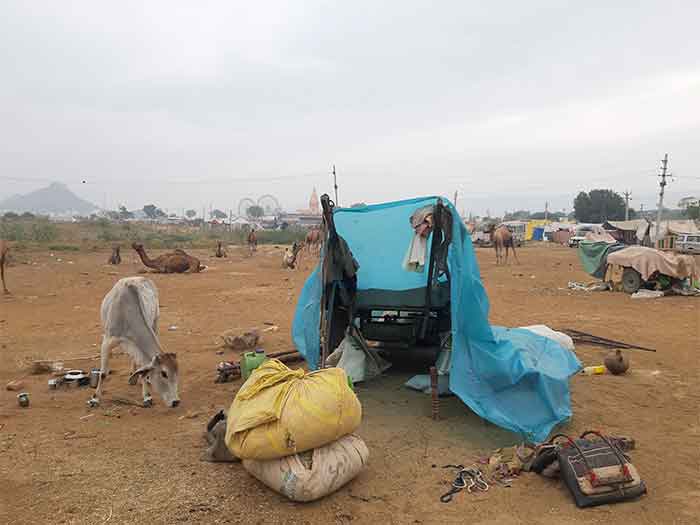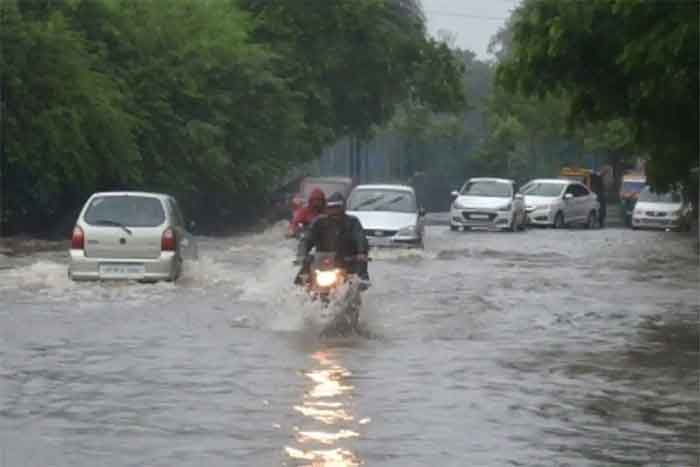
Rajasthan’s over 100 years old Pushkar Mela is one of the most famous and largest camel fairs in the world. Due to the Covid pandemic though, the event has taken a big hit with both low arrivals of camels for sales and plummeting prices for the animals.
“ I have been coming to Pushkar fair continuously for 10 years. This is the first time I am going back disappointed. Only 6 of my 15 camels have been sold. They were also sold at a loss. The cost of one camel of mine was at least 55-60 thousand rupees, but I had to sell one camel for only 32 thousand rupees. The other camels were also sold for less than 35 thousand rupees” laments Kashmir Singh, from Modi village in Sirsa, Haryana, who walked 7 days with his camels to reach Pushkar.
Kashmir Singh is not the only camel farmer saddened by the low prices of camels at the Pushkar fair held after two years. The Pushkar fair was not organized in 2020 due to Covid.
Like him, there were hundreds of camel herders who went back to their homes without selling their camels. They cite Covid as the biggest factor behind decline in prices, along with decreasing number of camels in the state and change in location of Pushkar fair.
Like Kashmir Singh, Sobha Saadak Khan, a camel farmer from Hanumangarh in Rajasthan, also looked very upset. Even on the last day of the fair, he was able to sell only 2 of his 10 camels. Sobha had reached Pushkar on November 1, three days before Diwali. One of his camels was sold for Rs 27000 and the other for Rs 25000. One was 5 years old and the other was 6 years old.
Saadak says, “ Usually the price of camels of this age ranges from 45-50 thousand rupees, but this time there were no customers, so camels had to be sold at a lower price.
The horses that came this time in the Pushkar fair were also the subject of discussion. According to the Rajasthan Animal Husbandry Department data, camels and horses came in almost equal numbers. According to the data, this time a total of 4,717 animals came to the fair. Of these, 2340 are camels, 2292 horses, 68 cows, 16 buffaloes and 2 donkeys. A total of 1170 animals were sold at the fair, including 525 camels and 645 horses. It is clear from the data that this time more horse breeds were sold in Pushkar fair than camels. Whereas not a single buffalo, cow and donkey were sold.
The statistics from the Animal Husbandry Department showed that this year recorded the least number of camels in the history of Pushkar fair, though the trend of lower numbers of camels arriving has been there for a decade. 15,460 camels came to the fair in 2001, 14,142 in 2005, 9,419 in 2010, 5215 in 2015 and only 3298 in 2019.
At the same time, the overall number of animals is also decreasing continuously. In 2001, a total of 21,418 animals came to the Pushkar fair, 23513 animals in 2005, 18582 in 2010, 10048 in 2015 and 7176 in 2019.
According to an official of the Animal Husbandry Department, whereas traders usually come from Punjab, Haryana, Gujarat, UP, MP and Maharashtra, this time not a single buyer of camels came from another state. Covid Response Watch spoke to Dr. Prafulla Mathur, Joint Director, Ajmer Division in Animal Husbandry Department in this regard.
Dr. Mathur said, “ There are many problems related to camels at present. One, the usefulness of camels is continuously decreasing. The use of camels in agriculture has almost come to an end. Second, this time the approval of the fair was also received much later. Due to which the cattle farmers remained confused and could not reach the fair. The Animal Husbandry Department also could not make its full preparations this time because we did not have any orders from the government to organize the fair. Animal exhibition, competitions and other activities also did not happen this time due to Covid. This directly affects the purchase and sale of animals. “
 Another major reason behind the low arrival and sale of camels in Pushkar is the Rajasthan Camel (Prohibition of Slaughter and Exchange of Temporary Migration or Export Act) enacted in 2015. Due to this law, cattle farmers cannot buy camels from Rajasthan and move them to another state. For this they need a permission letter from the District Collector. This process sometimes takes months.
Another major reason behind the low arrival and sale of camels in Pushkar is the Rajasthan Camel (Prohibition of Slaughter and Exchange of Temporary Migration or Export Act) enacted in 2015. Due to this law, cattle farmers cannot buy camels from Rajasthan and move them to another state. For this they need a permission letter from the District Collector. This process sometimes takes months.
“People from other states did not come to the Pushkar fair to buy camels because of the difficulties faced by them in transporting camels to other state” said Sohan Raika, a camel farmer of Pali at the fair
Sumer Singh, a resident of Sawanta village of Jaisalmer, has about 300 camels. He has brought his camels to the Pushkar fair many times, but has stopped coming here for the last three years.
According to Sumer Singh, “A major problem we face is that pastures and pathways are shrinking. This makes it very difficult for the camels to stop anywhere on the way. Earlier there were open pastures everywhere. The camels had no problem grazing and walking long distances. Camel farmers could also stay and spend the night anywhere, but in the last few years people including the forest department have fenced off their lands. Due to this the passage of camels has been blocked. Now if the camel farmer goes somewhere with his herd, one person has to be sent forward to find a place to stay. Even in villages on the way, people now look at us with suspicion, which was not the case even 10 years ago”
Sumer says that earlier a large number of camel herders from Jaisalmer, Bikaner and Barmer used to go the Pushkar fair. This time only a few people went with their camels because they suffer a lot due to the trouble on the way and also do not get the right price for the camels.
There is an alarming decline in the number of Rajasthan’s camels, which are often called the ‘lifeline of the desert’. According to the Animal Census 2019, only 2.13 lakh camels are left in Rajasthan now. There were 3.25 lakh camels in the state in 2012. Camel numbers have declined by 35 % in just seven years . However, camel farmers say that the actual number of camels is only 1.5 lakh.
About 85 percent of the country’s camels are found in Rajasthan. The camel was declared the state animal of Rajasthan in December 2014.
Recently, the Rajasthan High Court took suo motu cognizance of the ever-decreasing number of camels. The court appointed advocate Prateek Kasliwal as amicus curiae. Kasliwal in his report has talked about changes in the new law brought in 2015. According to the report, the smuggling of camels has increased after the law came into force and the camel farmers are also suffering financial loss due to this law.
The effect of these losses was evident at the Pushkar fair this year. The apprehension among the livestock owners is that if this trend continues, then in the next 4-5 years, camels will completely stop appearing at the Pushkar fair.
Madhav Sharma is a journalist based in Jaipur, Rajasthan













































